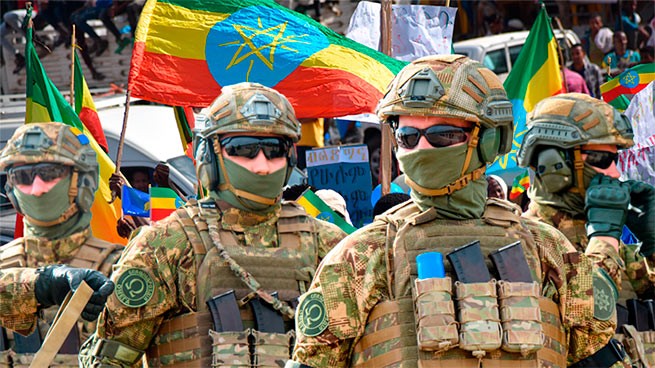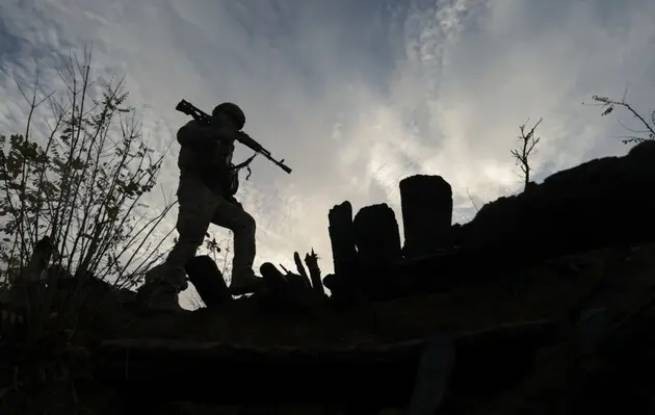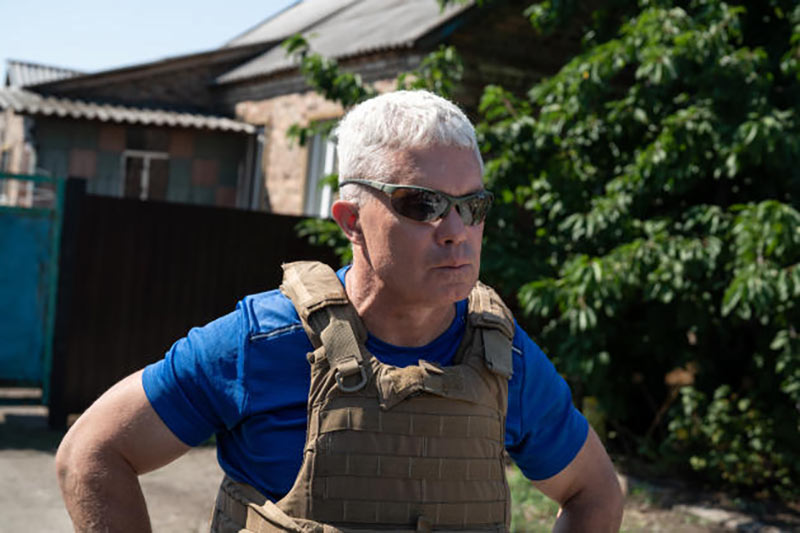According to the French publication Le Monde, employees of the American PMC Mozart, created in defiance of the Russian PMC Wagner, are doing dirty work in Ukraine that Washington cannot do.
In defiance of the well-known Russian PMC Wagner, Andrew Milburn, a veteran of the US Marine Corps and the founder of this organization, called it “Mozart”. According to a Le Monde front-page article, the Mozart paramilitary mercenary group is already in Ukraine, “solely for educational reasons,” i.e. to provide military know-how to Ukrainian units fighting there.
“We are in the Donetsk region, in the areas of Donbass that are still controlled by Ukrainians,” writes Samuel Gratakap, author Le Monde, – The front line is at a short distance. Before us is the building in which the hotel is located. The door is open, there is only a curtain that gives an unexpected homeliness to this corner of the world where the war is raging. The sound of a shell exploding nearby forces the hotel guests to leave. It’s about midnight now. The “guests” are humanitarian volunteers, special envoys – whatever that means – and a few soldiers on leave. Among them is a small group rushing to offer help where it is needed after the explosion. These are fighters from the Mozart Group, a private military company of American origin. We’re talking about 30 or so mercenaries. All 30 people are veterans who served in special forces units in their countries.
Andrew Milburn, founder of Mozart.
We’re doing the dirty work here that Washington can’t do. The Pentagon makes it clear that it has nothing to do with us, and distances itself from this war. It’s true”.
The above explanation is provided by Andrew Milburn, a Colonel in the US Army (despite his true English accent) who is now retired after 30 years in the US Marine Corps. He is the founder of the Mozart Group.
Since 2001, private military companies have been growing. In Iraq, Mali, and now in Ukraine. A war game involving a private company like Mozart could end up being extremely dangerous.
The next day, Andrew Milburn and his team are sent on a mission to Zaitsevo, a village on the front lines where some residents still remain. At each checkpoint, Mozart’s mercenaries hand out two cans of soda. This is their style. The avant-garde consists of six people who share two four-wheel drive vehicles. “It’s simple,” the leader explains, “we divided into two parts so that in the event of a Russian attack, the whole group would not be hit.”
All Mozart employees are between 30 and 45 years old, most of them Anglo-Saxons. There is also a Frenchman from Brittany, Desbes, who served three years in the French forces. At first, he wanted to go to war, joining the international battalion of “volunteers” created by the president of Ukraine. When he arrived in Ukraine, he began to doubt. There were too many young men in this battalion and there was a strict regulation that every volunteer had to stay in the unit for at least six months. Eventually Desbes decided to join Mozart, which offered more flexible contracts, and in general his co-workers had the same profile as him.
According to a 2012 study by the French National Assembly, companies like Mozart fit into a broader mix of 1,500 security companies operating around the world in much the same scope.

It is the choice of the name Mozart that is alienating and hints, even unintentionally, at the ambiguous danger of the situation in Ukraine. After all, simply Mozart is a response in a sarcastic and ironic style to the military analogue of the enemy, the Wagner group, whose activities we have been following for many years in Syria, Central Africa, Libya, long-suffering Sudan and even in Latin America (see Venezuela), most recently and in Mali, Africa.
Just 24 hours ago, the international media informed the world community that after a gigantic blunder by the Russian services, the Ukrainians managed to deliver a key blow to the Wagner headquarters in the Donbass. A few hours later, we learned about the activities of the military mercenary-volunteer group “Mozart” in the same area.
Watching the explanations of the founder of “Mozart”, given in a video posted on YouTube, even the most naive person understands that we are talking about a military structure, of course, of a private nature, but consisting of experienced, combat-ready and reeking of gunpowder soldiers from the elite units of the Western armed forces .
Unlike the well-known military company, also of American origin, Black Water in Iraq, Mozart, at least officially, insists that it is only active in humanitarian and military training missions. “If any of our people become personally involved in a military incident, they must leave the Mozart immediately,” Andrew Milburn explains, adding that none of the crew members carry weapons.

They’re not weapons, they’re mock-ups, Andrew Milburn tells reporters…
We escort the Mozart group as they advance towards Bakhmut, a city under constant fire from the Russians, who are retaking positions every day, forcing the Ukrainians to retreat. On the way, a woman pulls a water cart with a baby stroller attached to it. The young man persistently asks for something to eat. Near the market, which was recently bombed, about a dozen soldiers of the 72nd battalion of the Ukrainian army guard the area. On average, they are 20 years old. A member of Mozart’s group approaches and addresses this group of soldiers. “Are you interested in accelerated military training?” he asks.
It is a strange feeling, because this intervention gives the impression that the Mozart group is moving among us in a strange collegiate proximity, but which also takes on the character of a salesman. The Mozartians immediately make it clear that the accelerated military training course is free, lasts 10 days and involves intensive training in the use of various types of weapons and the consolidation of war tactics. Mozart’s staff promise impressive results.
The funny thing is that this whole deal – at the local level, which is carried out directly, does not go through the bureaucracy and control of the Ministry of Defense of Ukraine at all. In total, each 10-day military training seminar attracts about 40 Ukrainian soldiers, when there should have been twice as many. However, in the state of the front, not a single responsible Ukrainian commander of a large unit would allow such a number of fighters to leave defensive positions on the front line at the same time. “Everything is turned upside down here. We often train fighters after they have fought, and not before, as usual,” explains the Mozart veteran. According to the founder of the military company, Andrew Milburn, 2,500 Ukrainian soldiers have already been trained.

Ukrainian trainee
At the start of the war, Andrew Milburn arrived in Ukraine posing as a “freelance journalist”. Perhaps it was so, but after writing a few lines with a pen or notebook, the military veteran decided to create his unit with the help of private sponsorship via the internetaccording to the US military. Adding that, of course, all of this “private sponsorship” comes from people who wish to remain anonymous. Who can be convinced by such statements made with such a high degree of unintentional naivety? Let’s not forget, as Le Monde points out, that in February last year, after the first hours of the Russian attack, Washington did everything possible to remove from Ukraine the dozens of military advisers and instructors it had stationed in the country.
Despite the fact that the Americans are sending weapons to the Ukrainians, the US administration avoids sending American advisers and military instructors to Ukraine at all costs. However, this gap is filled by the famous Mozart, a private company of volunteer mercenaries, led by Andrew Milburn. After all, as it was said at the very beginning, the US Pentagon does not want to know anything about this company of veterans.
At the beginning of the article, it was reported that a group of two Mozart four-wheel drive vehicles with six veterans was heading to the village of Zaitsevo. Hearing the noise of car engines, the handful of villagers still living in the village came out of their shelters and basements to gather around two military vehicles filled with sacks of supplies. There is no water or electricity in the village, and even more so there is no way to transport supplies.
“But why don’t you leave?” asks Mozart’s interpreter. The woman in the mako, which is reminiscent of the Star Wars style, replies: “I still have a debt to my relatives.” The woman gives no other explanation…







More Stories
First negotiations between Ukraine and the Russian Federation on displaced children (video)
"Inflated hopes and delay in the onset" – what to expect on the battlefield in Ukraine
The EC responded to the decision of the Ukrainian Foreign Ministry to limit consular services and the impossibility of obtaining a foreign passport